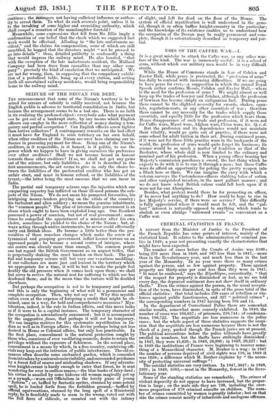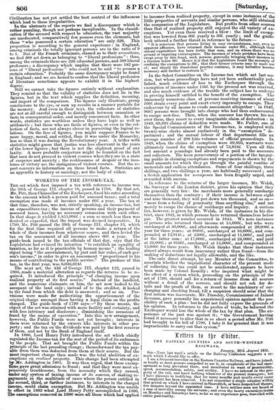CRIMINAL STATISTICS IN FRANCE.
A REPORT from the Minister of Justice to the President of the French Republic has some points of interest, mainly of the statistical kind. It relates to the administration of criminal jus- tice in 1849; a year not presenting exactly the characteristics that might have been expected. The number of cases before the Courts of Assize was 4190; being 278 more than in 1848, and 947 less than in'1847,—more than in the Revolutionary year, and much less than in the last year of the Monarchy. In no year were there so many crimes against the person, and so few against property. Those against property are thirty-nine per cent less than they were in 1847. " It must be confessed," says the Bpublique, sarcastically, " that if the respect for property is diminished or lost, as we are told every day, the depraved sentiment does not show itself in ordinary thefts." Even the crimes against the person, in the usual accepta- tion of the term, have diminished, in spite of the gross total of the official statistics : that total includes 238 cases of rebellion or vio- lences against public functionaries, and 327 " political crimes" ; the corresponding numbers in 1847 having been 104 and 15. In the department of Correctional Police there are somewhat similar results, somewhat more coarsely exhibited. In 1849, the number of cases was 164,057 ; of prisoners, 216,744 ; of condemna- tions, 189,722. The acquittals are less numerous in the police cases ; but the whole aspect of these statistics suggests the suspi- cion that the acquittals are less numerous because there is not the check of a jury, packed though the French juries are at present. The political accusations before the police tribunals have greatly swelled in numbers, but the thefts have strikingly diminished : in 1847, they were 41,626; in 1848, 26,896 ; in 1849, 29,227: but in 1849 the institutions of France were beginning to recover some- thing of a Monarchical character. M. Rouher is a wag.: in 1847 the number of persons deprived of civil rights was 116, in 1849 it was 1658; a difference which M. Rouher explains by " the Jewes- s].ty of protecting universal suffrage " ! The suicidal statistics are very curious. In 1847, 3647 ; in 1848, 3391; in 1849, 3583,—most in the Monarchy, fewest in the Revo- lutionary year. Some of the standing statistics are remarkable. The crimes of violent depravity do not appear to have increased, but the propor- tion is large ; on the male side they are 738, including the enor- mous proportion of 478 criminal assaults on children. The num- ber of crimes committed by women is greatly inferior; but on that, side the crimes consist mostly of infanticide and analogous offences.
Civilization has not yet settled the best control of the influences which lead to these irregularities.
In the abstracts of the reports we find a discrepancy which is rather puzzling, though not perhaps inexplicable. In the classifi- cation of the accused with respect to education, the vast majority are uneducated, comparatively few possess even the elements, but those " who possessed a certain education " are only 326. This proportion is according to the general experience : in England, among criminals the totally ignorant persons are in the ratio of 9 to 1. But of the French -criminals, classed as to their avocations, we find 508 set down as belonging to "liberal professions " : thus, among the criminals there are 326 educated persons, and 508 liberal professors ; a discrepancy which implies that there were 182 per- sons of " liberal professions " who could not be said " to possess a certain education." Probably the same discrepancy might be found in England ; and we are bound to confess that the liberal profession of literature sometimes appears to exhibit it in the highest degree.
Still we cannot take the figures entirely without explanation. They remind us that the validity of statistics does not lie in the figures, but in the text which supplies the definition, meaning, and import of the comparison. The figures only illustrate, group conclusions to the eye, or sum up results in a manner portable for the memory. And even in their text, the collectors of statistics are not at all careful enough to distinguish between causation or facts in consequential order, and merely concurrent facts. In other words, statistics are worthless unless they have logic as well as arithmetic ; but those who are facile at figures, or even in the col- lection of facts, are not always clever in perceiving the logical re- lations. On the face of figures, you might suppose France to be more happy, moral, and settled, than it was under the Monarchy, less so than it was during the Revolutionary year. A trifler with statistics might guess that justice was less observant in the years of the lower figures ; but there is not the slightest proof of any laxity. A more probable conjecture might be founded on the fact that men do not proceed to violent courses when they are in a state of suspense and anxiety ; the recklessness of despair or the inso- lence of victory are the instigators of violent courses. But the re- port conveys no information on those broad facts. Statistics are an appendix to history or sociology, not the body of either.



























 Previous page
Previous page